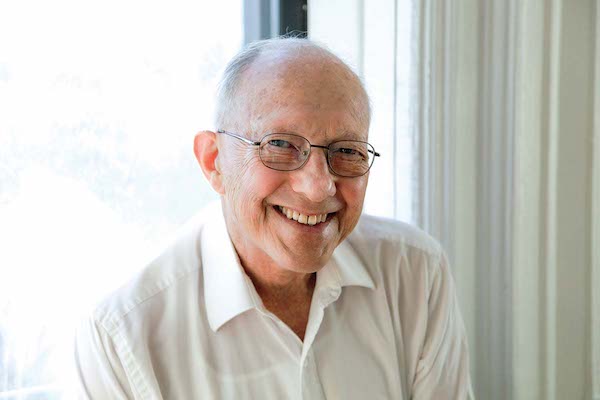Kalish spotlighted in varied chamber program from Lincoln Center

Wolf Trap has replaced its chamber music season with virtual concerts hosted by pianist Wu Han and cellist David Finckel, drawn from past performances by Chamber Music Society of Lincoln Center. The latest installment in their Front Row: National series, released to the public free of charge Friday night, featured veteran pianist Gilbert Kalish and friends, in recordings from as far back as 2015.
The most recent performance, George Crumb’s Three Early Songs, was recorded in 2019. Composed in 1947, this little triptych of Duparc-flavored juvenilia remained for years a private love letter to Crumb’s teenage sweetheart, later his wife. Kalish, who has a long association with the composer and has premiered many of his works, convinced Crumb to publish them, and we are all the richer for it.
Soprano Tony Arnold gave a radiant, unvarnished tone to the vocal part, enunciating the mysterious texts of Robert Southey and Sara Teasdale with immaculate clarity. The harmonic palette, largely tonal in this early work, only hinted at some dissonant colors that varied the fabric. Kalish’s touch at the keyboard supported Arnold with a transparent sheen of enveloping but not effacing sound.
One advantage of an organization like CMS, with a large complement of musicians to call on, is that it can explore less frequented territory of the chamber music repertoire. Such was the second work in this streamed concert, Schubert’s song sequence “Der Hirt auf dem Felsen,” composed in the year that the composer died.
Lisette Oropesa’s comely soprano voice proved ideally suited to the German texts about a lonely shepherd on a rocky hill. She sparkled most in the agile runs of the third section, full of hope for the coming spring. Clarinet David Shifrin was an equal partner as Schubert intended, the lonely woodwind instrument, especially its rich chalumeau register, mimicking the shepherd’s pipe. Again Kalish was the guiding spirit, helping his two soloists weave their lines together.
The climax of this streamed event was the Piano Quartet No. 3 of Brahms. Cast in the gloomy key of C minor, this piece is one of the composer’s greatest achievements in chamber music. Violinist Nicolas Dautricourt, violist Paul Neubauer, and cellist Torleif Thedéen spun a gorgeous, somber braid of sound in the opening theme of the first movement. Kalish took over brilliantly in the second theme, comfortable in the piano part’s starring role in this work, and lending plenty of storminess to the development.
Kalish’s vibrant playing continued to stoke the fires in the Scherzo, again mostly the pianist’s show. In turn each of the string players took the lead in the smoldering third movement, an Andante of Brahmsian emotion, so intense because it is mostly submerged but no less vivid. No tempo in the performance felt rushed just to make an impression, a quality that infused the finale with restless but heroic passion.
All in all the stream includes under an hour of music, with the remaining thirty minutes devoted to talking. Between pieces, Wu Han and David Finckel offer brief introductions to each work, as well as leading a longer conversation with Kalish at the conclusion of the recording. The most charming of these non-musical components was the opening artist portrait of Kalish, a monologue shot at home during the pandemic.
Viewers get a chance to see Kalish, 85, cooking, reading the newspaper, taking walks in Riverside Park on the Upper West Side, interacting with his students on video calls, going through old papers and correspondence, and practicing Bach for pleasure. Kalish finds himself gravitating to Bach a lot these days, returning to pieces that he last played as a student sixty-five years ago. “Like Shakespeare, Bach is for the ages,” he muses, “and it doesn’t get old.”
The era of social distance has been curiously fulfilling in some ways for Kalish. “The loss of physical contact has drawn me closer to people,” he observes, “rather than further apart from them.” In a wistful turn, he notes that his life remains full, at times overwhelmingly so. “When I walk in the park,” he says, “I still feel, in a profound sense, youthful.”
This recording can be streamed through December 9. wolftrap.org
